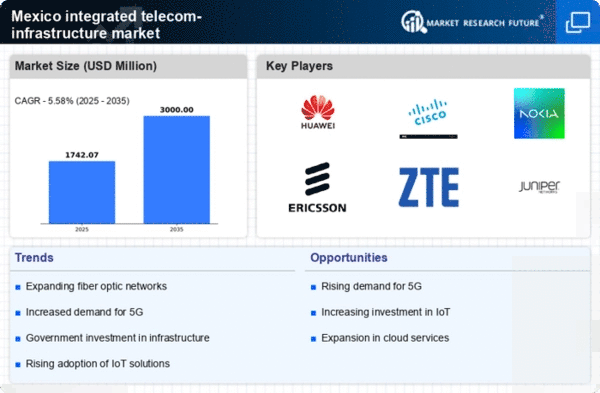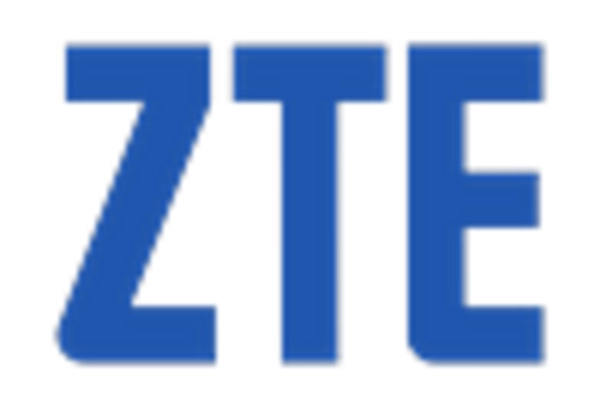Emergence of Smart Cities
The concept of smart cities is gaining traction in Mexico, which is likely to have a profound impact on the integrated telecom-infrastructure market. As urban areas evolve, the demand for advanced telecommunications infrastructure to support smart technologies is increasing. Smart city projects often require extensive data collection and real-time communication, necessitating robust telecom networks. Reports indicate that investments in smart city initiatives in Mexico could reach $5 billion by 2027, driven by the need for efficient public services and enhanced quality of life. This trend compels telecom operators to invest in innovative solutions, such as IoT and AI, to support the infrastructure required for smart city applications. Consequently, the integrated telecom-infrastructure market is poised for growth as cities adapt to these technological advancements.
Focus on Cybersecurity Measures
As the integrated telecom-infrastructure market in Mexico continues to expand, the focus on cybersecurity measures is becoming increasingly critical. With the rise in digital services, the risk of cyber threats has escalated, prompting telecom providers to prioritize the security of their networks. Recent reports indicate that cyberattacks on telecom infrastructure have increased by 25% in the last year, highlighting the urgent need for robust security protocols. In response, many companies are investing in advanced cybersecurity technologies and practices to safeguard their systems. This emphasis on security not only protects consumers but also enhances the overall reliability of the integrated telecom-infrastructure market. As telecom operators adopt stringent security measures, they are likely to foster greater trust among users, which could further stimulate market growth.
Increased Mobile Data Consumption
The integrated telecom-infrastructure market in Mexico is witnessing a significant rise in mobile data consumption, driven by the widespread adoption of smartphones and mobile applications. Recent statistics reveal that mobile data traffic in Mexico has surged by over 30% in the past year, as consumers increasingly engage with streaming services, social media, and online gaming. This trend necessitates the expansion of mobile networks and the enhancement of existing infrastructure to accommodate the growing demand for data services. Telecom operators are likely to invest heavily in upgrading their networks, particularly in urban areas where data consumption is highest. As a result, the integrated telecom-infrastructure market is expected to benefit from these investments, leading to improved service quality and customer satisfaction.
Rising Demand for High-Speed Connectivity
The integrated telecom-infrastructure market in Mexico is experiencing a notable surge in demand for high-speed connectivity. As businesses and consumers increasingly rely on digital services, the need for robust telecommunications infrastructure becomes paramount. Recent data indicates that the number of broadband subscriptions in Mexico has grown by approximately 15% annually, reflecting a shift towards faster internet services. This trend is driven by the proliferation of smart devices and the growing popularity of cloud-based applications. Consequently, telecom providers are compelled to enhance their infrastructure to meet these demands, thereby fostering growth within the integrated telecom-infrastructure market. The expansion of fiber-optic networks and 5G technology is likely to play a crucial role in addressing this demand, ensuring that both urban and rural areas benefit from improved connectivity.
Government Initiatives for Infrastructure Development
In Mexico, government initiatives aimed at enhancing telecommunications infrastructure are significantly influencing the integrated telecom-infrastructure market. The Mexican government has launched various programs to promote investment in digital infrastructure, particularly in underserved regions. For instance, the National Digital Strategy aims to increase internet access to 85% of the population by 2025. This initiative is expected to attract private investments, with estimates suggesting that up to $10 billion could be allocated to improve connectivity. Such government support not only facilitates the expansion of telecom networks but also encourages competition among service providers, ultimately benefiting consumers. The integrated telecom-infrastructure market stands to gain from these initiatives, as they pave the way for modernized infrastructure and improved service delivery.
















